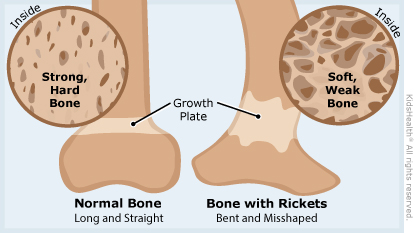Rickets: How to Care for Your Child
Rickets is when a child's bones become weak and soft. Usually, this happens because a child isn't getting enough vitamin D. Sometimes another medical problem, like kidney disease, can cause it. Most kids with rickets get better with treatment.

Treatment includes vitamin D, calcium, and/or phosphorus supplements. If another medical problem is causing your child's rickets, you may go to a specialist for care.

-
Give your child any prescribed supplements as directed by your health care provider.
-
Our bodies make vitamin D when exposed to sunlight. Follow the instructions for how much sun exposure your child should have. Your child should always wear sunscreen of SPF 30 or higher when in the sun. Reapply according to package instructions.
-
Go to all follow-up visits so the health care provider can recheck your child's blood work.
-
Talk with a registered dietitian to be sure that your child gets enough vitamin D, calcium, and phosphorus.

Your child:

Your child:

Why is vitamin D important? Vitamin D helps the body absorb minerals like calcium and phosphorus that make bones hard. Without enough of those minerals, bones start to bend and become misshapen. Kids can have muscle weakness or pain, short height, and dental problems, and they are more likely to break a bone.
How do low vitamin D levels cause rickets? Kids' bones grow when new bone tissue forms at growth plates, areas of growing tissue near the end of the long bones. Calcium and phosphorus attach to growth plates so they can build strong, hard bone. If vitamin D levels are low, the body and bones can't absorb enough calcium and phosphorus, and the growth plates stay soft and weak.